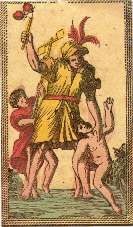full deck
Though we partially covered the fool in the "Magician", I thought that this excerpt provided an good commentary on this particular image of the fool from the Minchiate:
(see "Wisdom of the Fool")By the end of the fifteenth century, a fairly complex set of ideas and associations had gathered around the figure of the fool. At worst, he was considered a sinful instrument of vice, who was blind to the truth and had no hope of salvation. It has been suggested that this attitude goes back to Saint Jerome, who translated the opening of Psalm 53/52 with Dixit insipiens in corde suo, rendering the Hebrew word “nabal” as “fool” rather than as “vile or morally deficient person.”
At best, the fool was a simple innocent, devoid of the pretentions of learning and the corruptions of worldly wisdom, into whom the spirit of God could most easily enter. The most universal characteristics of the fool, however, lay somewhere in between the two opposite poles represented by the fool of Saint Jerome and the fool of Saint Paul; for these are his social rather than his religious characteristics. On the one hand, he could be found in any rank of society; on the other, he was the shameless critic of all ranks. He saw through the hypocrisy of social status and noble sentiments; he exposed the vanity of beauty and learning. He did not believe in honor, order, measure, prudence, justice, chastity, or any of the stoical restraints society imposes upon itself. If Hercules at the crossroads between virtue and pleasure had traditionally opted for virtue, the fool resolutely took the other fork and sought gratification for the body rather than the spirit, arguing that there will still be cakes and ale though some are virtuous.
It had long since been recognized, however, that he was a formidable adversary, not just because he refused to abide by the accepted rules, but because his jocose antics, like all play, could easily turn into high seriousness and his unbridled tongue was capable of truth as well as foolishness.


